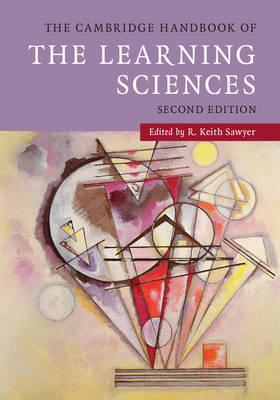
The Cambridge Handbook of the Learning Sciences
Cambridge University Press (Verlag)
978-1-107-03325-2 (ISBN)
The interdisciplinary field of the learning sciences encompasses educational psychology, cognitive science, computer science, and anthropology, among other disciplines. The Cambridge Handbook of the Learning Sciences is the definitive introduction to this innovative approach to teaching, learning, and educational technology. This dramatically revised second edition incorporates the latest research in the field, includes twenty new chapters on emerging areas of interest, and features contributors who reflect the increasingly international nature of the learning sciences. The authors address the best ways to design educational software, prepare effective teachers, organize classrooms, and use the internet to enhance student learning. They illustrate the importance of creating productive learning environments both inside and outside school, including after-school clubs, libraries, museums, and online learning environments. Accessible and engaging, the Handbook has proven to be an essential resource for graduate students, researchers, teachers, administrators, consultants, educational technology designers, and policy makers on a global scale.
R. Keith Sawyer is Morgan Distinguished Professor in Educational Innovations at the University of North Carolina at Chapel Hill School of Education. He studies creativity, innovation, and learning, with a focus on collaborating groups and teams. He is the author or editor of thirteen books, including Group Genius: The Creative Power of Collaboration (2007), Explaining Creativity: The Science of Human Innovation (2012) and Zig Zag: The Surprising Path to Greater Creativity (2013).
Preface R. Keith Sawyer; 1. Introduction: the new science of learning R. Keith Sawyer; Part I. Foundations: 2. Foundations of the learning sciences Mitchell J. Nathan and R. Keith Sawyer; 3. Scaffolding Brian J. Reiser and Iris Tabak; 4. Metacognition Philip H. Winne and Roger Azevedo; 5. A history of conceptual change research: threads and fault lines Andrea A. diSessa; 6. Cognitive apprenticeship Allan Collins and Manu Kapur; 7. Learning in activity James G. Greeno and Yrjö Engeström; Part II. Methodologies: 8. Design-based research: a methodological toolkit for engineering change Sasha Barab; 9. Microgenetic methods Clark A. Chinn and Bruce L. Sherin; 10. Analyzing collaboration Noel Enyedy and Reed Stevens; 11. Frontiers of digital video research in the learning sciences: mapping the terrain Ricki Goldman, Carmen Zahn and Sharon J. Derry; 12. A learning sciences perspective on the design and use of assessment in education James W. Pellegrino; 13. Educational data mining and learning analytics Ryan Baker and George Siemens; Part III. Practices that Foster Effective Learning: 14. Project-based learning Joseph S. Krajcik and Namsoo Shin; 15. Problem-based learning Jingyan Lu, Susan Bridges and Cindy E. Hmelo-Silver; 16. Complex systems and the learning sciences Uri Wilensky and Michael J. Jacobson; 17. Tangible and full-body interfaces in learning Michael Eisenberg and Narcis Pares; 18. Embodiment and embodied design Dor Abrahamson and Robb Lindgren; 19. Videogames and learning Constance Steinkuehler and Kurt Squire; Part IV. Learning Together: 20. Knowledge building and knowledge creation: theory, pedagogy, and technology Marlene Scardamalia and Carl Bereiter; 21. The social and interactive dimensions of collaborative learning Naomi Miyake and Paul A. Kirschner; 22. Arguing to learn Jerry Andriessen and Michael Baker; 23. Informal learning in museums Kevin Crowley, Palmyre Pierroux and Karen Knutson; 24. Computer-supported collaborative learning Gerry Stahl, Timothy Koschmann and Daniel Suthers; 25. Mobile learning Mike Sharples and Roy Pea; 26. Learning in virtual worlds Yasmin B. Kafai and Chris Dede; Part V. Learning Disciplinary Knowledge: 27. Research in mathematics education: what can it teach us about human learning? Anna Sfard and Paul Cobb; 28. Science education and the learning sciences as co-evolving species Nancy Butler Songer and Yael Kali; 29. Learning historical concepts Mario Carretero and Peter Lee; 30. Learning to be literate Peter Smagorinsky and Richard E. Mayer; 31. Arts education and the learning sciences Erica Rosenfeld Halverson and Kimberly M. Sheridan; Part VI. Moving Learning Sciences Research into the Classroom: 32. Learning sciences and policy design and implementation: key concepts and tools for collaborative engagement William R. Penuel and James P. Spillane; 33. Designing for learning: interest, motivation, and engagement Sanna Järvelä and K. Ann Renninger; 34. Learning as a cultural process: achieving equity through diversity Na'ilah Suad Nasir, Ann S. Rosebery, Beth Warren and Carol D. Lee; 35. A learning sciences perspective on teacher learning research Barry J. Fishman, Elizabeth A. Davis and Carol K. K. Chan; 36. Conclusion: the future of learning: grounding educational innovation in the learning sciences R. Keith Sawyer.
| Erscheint lt. Verlag | 17.11.2014 |
|---|---|
| Reihe/Serie | Cambridge Handbooks in Psychology |
| Zusatzinfo | 15 Tables, unspecified; 1 Maps; 17 Halftones, unspecified; 34 Line drawings, unspecified |
| Verlagsort | Cambridge |
| Sprache | englisch |
| Maße | 180 x 255 mm |
| Gewicht | 1510 g |
| Themenwelt | Geisteswissenschaften ► Psychologie ► Allgemeine Psychologie |
| Geisteswissenschaften ► Psychologie ► Pädagogische Psychologie | |
| Geisteswissenschaften ► Psychologie ► Verhaltenstherapie | |
| ISBN-10 | 1-107-03325-X / 110703325X |
| ISBN-13 | 978-1-107-03325-2 / 9781107033252 |
| Zustand | Neuware |
| Haben Sie eine Frage zum Produkt? |
aus dem Bereich


